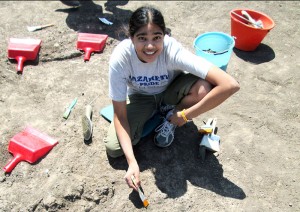Student’s name: Amanda Khan
- Expert Role: Laboratory Expert
- Major: Human Biology
- Class: Graduate Student
- Hometown: Rochester, New York
(May 2015 & May 2016)
Why is this humanitarian work important to you?
As a forensic anthropologist in training, I get to play a part in giving closure to families that have lost their loved ones. I get to play a part in giving someone their identity back. These reasons are exactly why I wanted to become a forensic anthropologist. I can’t imagine what it must be like for the families of the unidentified border crossers. My heart goes out to them. This work is important to me because these families deserve to know what happened to their loved ones and their loved ones deserve to be remembered.
What do you hope to gain from this experience?
This season our team will be shifting our focus away from burial excavations and moving towards doing more laboratory work. I hope to gain more experience in skeletal analysis and expand on my abilities as a forensic anthropologist. Also, since this is my first time going to Texas, I hope to gain a better understanding of the situation in Falfurrias.
What are some of the biggest challenges you will face while in Texas?
I think the biggest challenges I will face in Texas will be emotional. I have been following the Falfurrias story over the years through the news and through my teammate’s experiences, but I think that being there and experiencing it for myself will be overwhelming.
What’s one thing people probably don’t know about you until they’ve known you a long time?
I’m an avid reader and I read everything. From classic literature, to poetry, to bad romance novels and comic books. I love it all.
When did you know you wanted to pursue human biology as a degree, and how did you become interested in forensics?
I became interested in forensics because I wanted to make a difference and help people. When I started to apply to graduate schools I tried to find a program that took my love of human anatomy and anthropology and put them together in one degree. It turned out that the degree I had been looking for was human biology.
What advice would you give other students interested in pursuing a human biology degree at UIndy?
The advice I would give to other students is to take a lot of science classes. Human anatomy and osteology are essential, but also take classes like organic chemistry, geology, genetics, human evolution, physiology, and statistics. Having a strong foundation in science will be incredibly helpful for this degree.
What makes UIndy’s human biology program distinctive?
What makes UIndy’s human biology program distinctive is all of the opportunities they offer their students. Our students get the chance to travel all over the world for research, to participate in humanitarian work, to teach classes at the university and so much more. All of these opportunities really give our students a leg up when they apply to doctoral programs. It makes them stand out from all the other applicants.
